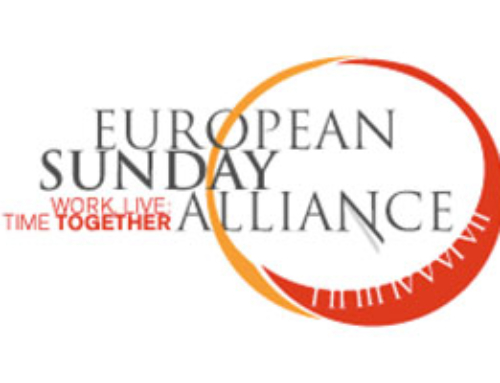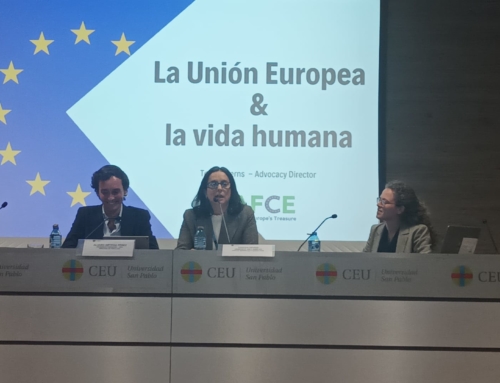FAFCE contribution to the 4th Council of Europe Summit (Reykjavik 16-17 May 2023)
22 February 2023,
The Council of Europe organises its 4th Summit of Heads of State and Government, in Reykjavik, Iceland, on 16 and 17 May. This an important event, as the last Summit of this kind took place in Warsaw in 2005, while the other two took place in Strasbourg in 1997 and in Vienna in 1993 (more info here). At the Warsaw Summit, the Council of Europe adopted an action plan where a chapter was devoted to “Building a more human and inclusive Europe“: “We are convinced – one can read in the action plan – that social cohesion, as well as education and culture, are essential enabling factors for effective implementation of Council of Europe core values in our societies and for the long-term security of Europeans.” The chapter also continued focusing on the need to build a Europe for children… But without never referring to the family as the fundamental engine of social cohesion and the first natural framework for the development of children.
Ignoring the family did not bring good results: “As the Secretary General noted in her 2021 report “State of human rights, democracy and the rule of law – A democratic renewal for Europe”, we are witnessing a “clear and worrying degree of democratic backsliding”. “Europe’s democratic environment and democratic institutions are in mutually reinforcing decline” (quoted in the report of the Council of Europe High-Level Reflection Group in October 2022, p. 13). Moreover, “the year 2022 will be remembered as one of terrible violence and seismic change in Europe” (ibidem, p. 9), with a terrible war in Ukraine whose end still seems to be far.
In this context, this year’s Summit “strives to ensure that the Council of Europe is able to meet current and future challenges, as well as the expectations of future generations“. For that reason, the Council of Europe is seeking contributions to a questionnaire from all Council of Europe stakeholders, including NGOs with participatory status, such as FAFCE.
The Federation encourages the Council of Europe to invest in the family and in Europe’s demographic future: “We cannot think about digital or ecological transitions, or even the promotion of human rights in Europe without a next generation to meet these challenges. This is simply about the human future of Europe“. In this sense, it emphasises the key role of family associations as partners in the development of ambitious public family policies, of stronger democracies and of peaceful societies.
How can the Council of Europe create a framework for effective action on current and future challenges (e.g., on issues such as the environment and human rights, inequality and digital issues)?
The Federation of Catholic Family Associations in Europe (FAFCE) is an organisation representing 32 family associations from 19 European countries, with participatory status at the Council of Europe since 2001.
Our Federation wishes to draw the attention of the Council of Europe to the European demographic challenge.
Europe is facing a clear pattern of declining birth rates: in 2018, the average number of births in the EU was 1.55 per woman. This is below the value of 2.1 considered to be the level required to keep the population size constant. By 2070, 30.3% of the European population will be aged 65 or over (compared to 20.3% in 2019). The demographic imbalance goes hand in hand with a shrinking available workforce and an increasing old-age dependency ratio, especially with the retirement of the baby-boom generation, with a peak expected in 2050.
No European country reaches 2.1 children per woman. The lowest fertility rates were recorded in Malta (1.23), Spain (1.26) and Italy (1.29).
Against the backdrop of the demographic imbalance in Europe, the FAFCE offers a simple solution: invest in the family, in couples who want to have children but face economic, professional, social and cultural obstacles. Instead of adapting to demographic change, we can still reverse it, in order to have a sustainable and prosperous society.
FAFCE calls European decision-makers to establish a European Natality Pact. It would mean to ensure that there are no obstacles in public policy that interfere with parents’ personal commitment and desire to develop their families. Our Federation advocate for this solution when meeting with national ministers, as well as with the institutions of the Council of Europe and public opinion.
We encourage the Council of Europe to be a forum for exchange on demographic issues. We cannot think about digital or ecological transitions or even the promotion of human rights in Europe without a next generation to meet these challenges. This is simply about the human future of Europe.
What should be the role of the Council of Europe in the evolution of the European multilateral architecture and global governance?
“Families’ are Europe’s Treasure and building block for the future”. This is the title of our Declaration made on the occasion of the 20th Anniversary of our Federation. We referred to recitals 8, 16 and 27 of the European Social Charter, recalling that the family has the right to appropriate social, legal and economic protection to ensure its full development (recital 16); recalling that all persons with family responsibilities and who are engaged or wish to engage in employment have a right to do so without being subject to discrimination (recital 27); recalling also that employed women, in case of maternity, have the right to a special protection (recital 8).
But what is the Council of Europe doing to ensure the implementation of these principle in Member States? Which is the role of the Council of Europe? If we really believe that the “family is the natural and fundamental group unit of society and is entitled to protection by society and the State”, as stated by article 16.3 of the Universal Declaration of Human Rights, we cannot avoid asking these questions, which are also fundamental for the global governance.
The CoE Strategy for the Rights of the Child (2016-2021) recognised that “Children enormously value relationships with their parents and siblings” and that “Families can be confronted with numerous challenges. (…) Many parents lack support in fulfilling their role in raising their children and guaranteeing their rights”.
In order to support Member States in recognising that reality, empirical data and analysis are essential. In 2009, the Committee of Experts on Social Policy for Families and Children developed a comprehensive questionnaire on national family policies and compiled 40 national replies, which formed “a large database with detailed quantitative and qualitative data on all relevant sectors of family policy” allowing to analyse developments and dynamics of family policies in a number of Council of Europe Member States (Family Policy in Council of Europe Member States, Introduction). Several years later a new publication of this kind would be a good starting point for a renewed family policy to answer to the challenges of the demographic winter and to respond to the real needs of all Europeans.
How can the Council of Europe become a more modern organisation with a suitable framework to better support its member states and respond to current and future challenges?
The Federation of Catholic Family Associations in Europe would like to bring to the attention of the Council of Europe the role of civil society actors as experts on the real needs of Europeans, closer to the ground reality.
We would particularly like to emphasise the role and importance of family associations.
Family associations have a double mission: first, they act as ” solidarity villages” for families, who often feel alone in the face of certain challenges, such as the environment, digitalisation and the education of their children. They interpret the needs of families locally and take initiatives to meet them by providing services, trainings, educational assistance, etc.. When networking, families are informed and supported, and can connect with other families experiencing in the same situation.
Secondly, family associations have the function of representing families in the public and political sphere, by formulating their needs and demands and promoting the contribution they offer for free to society. They are a permanent source of proposals to economic, social and political actors: in this way, families become protagonists of family policies, rather than mere passive recipients.
Family associations can be local, regional or national. They have a wide range of missions: housing support, education assistance for children, welcoming migrant families, helping young mothers in distress and parents of disabled children, and more.
Family associations are a key actor in the democracy and in the participation of organised civil society in the respect of human rights in Europe. They are directly represented within the Council of Europe by their European Federation, FAFCE, within the framework of the Conference of International NGOs.
For more information on the role of families for democracy in Europe: FAFCE 2021 Spring Board Resolution: The Family is the Democratic and Demographic Future of Europe









